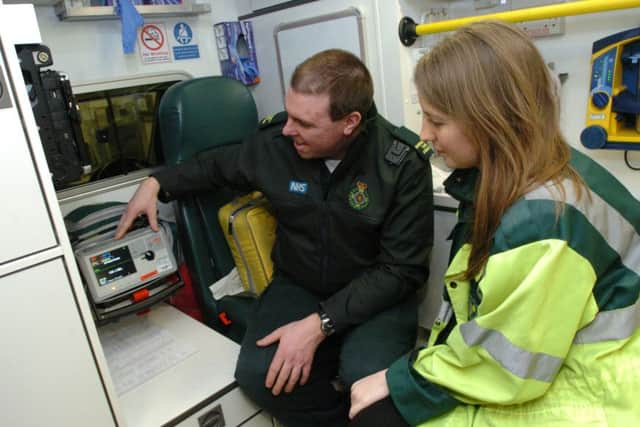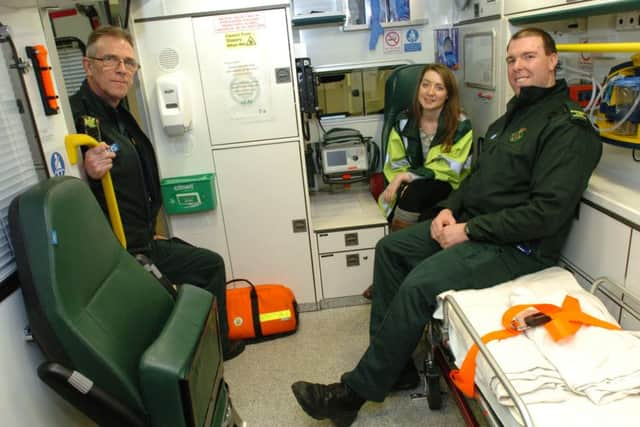Out on the road with the ambulance crew


The ability to make someone laugh, even when they are scared and in pain, is one of the social skills that are crucial for Mick and his crew mate Jon Sayer.
I joined the East of England Ambulance Trust crew for a shift to see what a day in the life of a paramedic is like – and there’s a lot more to it than what you see on Casualty.
Advertisement
Hide AdAdvertisement
Hide AdThe first thing I learnt was; it involves some very early starts. We were in our ambulance ready to go by 6.45am and didn’t clock off until gone 3pm, which counts as a ‘short’ shift for the crews; usually they do 12 hours or more with only 30 minutes of uninterrupted break.


“Long winter nights” are apparently the worst thing about the job, but both Mick, 54, and Jon, 34, struggled to think of many downsides.
Jon said: “The best thing about the job is the people you meet and help.”
On a typical day the crew completes about one job an hour, which means going to the scene, treating the patient and then driving them to hospital where they do a handover to the A&E ward sister.
Advertisement
Hide AdAdvertisement
Hide AdOur first call of the day was from staff in Sainsbury’s in Bramingham who were concerned for a customer who appeared disorientated and agitated. When we picked him up he was very stressed and confused and so freezing cold he could not stop shaking.


He told us he had schizophrenia and we took him to hospital for a check-up and a hot cup of tea.
Next call was to a one-year-old who had cut himself with a razor. When I walked into the house and saw a screaming baby covered in blood, my stomach turned and I braced myself for horror.
Fortunately the little man had only nicked his finger and it looked (and sounded) a lot worse than it was.
Advertisement
Hide AdAdvertisement
Hide AdJon demonstrated how fantastic he is with children as he calmed him down and treated the injury, then was left holding the baby as mum packed a bag to go to hospital.
Apart from the baby’s finger, we didn’t see any blood on our other visits but a couple of the call-outs to some very ill elderly people were distressing.
The patients themselves were almost too sick to know what was going on but it was seeing their partners that was the most heartbreaking. One woman looked so scared and sad as her husband was taken into the ambulance and a gentleman who told us his wife was all he had left as he cried and kissed her goodbye was enough to make all of us well up.
Jon and Mick did their best to comfort the relatives, with Jon helping the husband pack a bag for his wife and listening to his worries, but their main priority has to be the health of the patient.
Advertisement
Hide AdAdvertisement
Hide AdMick said: “Seeing the way elderly people are treated breaks my heart. Some of them are so lonely and there is no respect for them. I would love to stay and talk to them all day but we can’t. We just try to chat to them and make them smile whilst we are there.”
Mick used to be a plumber before training as a paramedic and he said in some ways the professions aren’t all that different.
He said: “You get a sent out on a call, you get there, you listen to the person so you can work out what the problem is, and then you work to fix the problem.”
His career change was inspired by his desire to do something meaningful, although both he and Jon get embarrassed if you try to tell them they are ‘saving lives’.
Mick says: “We are just doing our job.”
Advertisement
Hide AdAdvertisement
Hide AdMick and Jon analyse the day’s jobs on their way home, especially the difficult ones, to see if there was anything they could have done differently.
Mick said: “As long as you know you did the best job you could, then you can go home satisfied and switch off from it all.”
The camaraderie between the crew is lovely to see and we had a laugh throughout the shift which helped to keep spirits up when we saw upsetting things (and when tiredness set in on my part).
It was an eye-opening day and made me appreciate the ambulance service even more.
So if you ever need to call 999 and Mick and Jon knock on your door, count yourself very lucky indeed...and prepare to crack a smile.